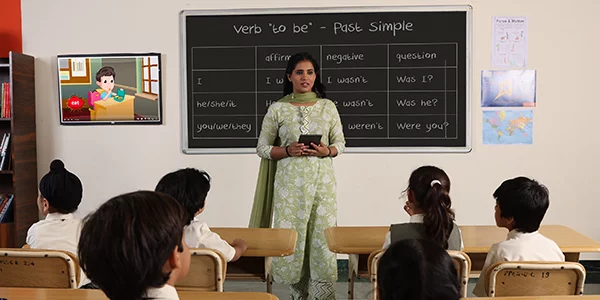Personalized Primary Science Tuition Singapore to Cater to Your Child’s Needs
Personalized Primary Science Tuition Singapore to Cater to Your Child’s Needs
Blog Article
Discover the Necessary Benefits of Recognizing Main Scientific Research for Young Students
The significance of key science education and learning for young learners extends much past simple understanding acquisition; it offers as an essential column in establishing essential skills such as critical thinking, problem-solving, and creativity. Engaging with clinical ideas through inquiry-based and interactive tasks not only grows inquisitiveness however also lays the groundwork for durable, certain learners.
Enhancing Critical Thinking Skills
Promoting critical believing skills in young learners is important for their cognitive advancement and future scholastic success. Crucial reasoning allows youngsters to examine details, evaluate proof, and make informed decisions, which are essential skills in today's information-rich culture. By participating in scientific inquiry, young learners can boost these skills as they check out concepts with thinking, trial and error, and observation.
In main scientific research education, instructors can facilitate critical thinking by motivating pupils to ask concerns, develop theories, and perform experiments. This hands-on method enables kids to exercise problem-solving and develop rational reasoning abilities. When students explore the properties of materials or the principles of movement, they find out to examine their findings critically and attract final thoughts based on evidence.
In addition, discussions and collective projects can promote crucial thinking by providing possibilities for students to verbalize their ideas, challenge presumptions, and take into consideration varied point of views. By developing an encouraging atmosphere that values inquiry and reflection, educators can support essential assuming skills that equip young learners to end up being long-lasting students and independent thinkers. Eventually, enhancing these abilities lays a robust structure for their future scholastic ventures and personal development.
Promoting Curiosity and Expedition

Key scientific research education and learning offers an organized environment where young students can discover different phenomena via hands-on experiments and observations. By enabling them to connect with materials and involve in inquiry-based learning, instructors produce possibilities for children to develop theories, test their concepts, and reason. Such experiences support a sense of wonder and enjoyment concerning science.

Structure Self-confidence in Trouble Addressing
Structure self-confidence in analytical is a critical part of key scientific research education that empowers young learners to approach obstacles with resilience and imagination - primary science tuition Singapore. When kids are encouraged to involve with clinical principles with hands-on activities and inquiry-based knowing, they develop essential abilities in important thinking and evaluation. This process not just improves their understanding of clinical principles but likewise promotes a sense of possession over their knowing
To construct confidence, educators need to produce a helpful environment where errors are deemed possibilities for growth instead than failings. This urges trainees to take threats and check out numerous services to issues. By providing scaffolding and advice, instructors can aid students navigate intricate tasks, slowly increasing their self-reliance in analytic circumstances.
Furthermore, collective knowing experiences, such as group projects or experiments, can further enhance students' self-confidence as they find out to express their ideas and pay attention to try this others' point of views. These interactions nurture social skills and enhance the concept that analytical is usually a cumulative undertaking. Eventually, cultivating confidence in analytic prepares young students for future academic obstacles and furnishes them with the tools needed for lifelong learning.
Encouraging Creative Thinking and Advancement
In the realm of main science education and learning, urging imagination and technology is vital for cultivating a dynamic understanding setting. By cultivating a culture where young students can check out concepts and experiment easily, educators assist students establish essential assuming skills and an interest for exploration. Imagination in scientific research encourages kids to ask concerns, design hypotheses, and involve in hands-on activities that boost their creativity.
Incorporating open-ended projects and inquiry-based discovering into the curriculum permits students to reveal their unique viewpoints and remedies. For instance, when entrusted with solving an issue pertaining to their environment, students can brainstorm numerous approaches, resulting in creative end results that showcase their originality. This not just grows their understanding of scientific concepts but additionally imparts a sense of ownership over their learning process.
Additionally, imaginative scientific research education supports partnership among peers, as pupils often share concepts and improve each other's insights - primary science tuition Singapore. This joint spirit imp source advertises not only technology but likewise necessary social abilities. Therefore, by prioritizing creativity and innovation in primary scientific research education and learning, we encourage young students to believe seriously, welcome difficulties, and imagine possibilities, laying a strong structure for long-lasting discovering and expedition
Planning For Future Understanding Difficulties
Young students' ability to navigate future understanding obstacles rests on a solid structure in main science education and learning. This fundamental understanding outfits trainees with crucial thinking abilities and a systematic approach to analytical, necessary for dealing with complex problems in an ever-evolving world. Main science promotes inquiry-based knowing, urging pupils to ask inquiries, discover hypotheses, and involve in hands-on experiments.
As they establish these abilities, learners become skilled at evaluating information, acknowledging patterns, and drawing educated verdicts. Such competencies are essential not just in clinical fields yet also in mathematics, design, and modern technology (STEM), where you could check here interdisciplinary expertise is increasingly crucial.
Additionally, key scientific research education cultivates a sense of interest and strength in young learners, enabling them to see difficulties as possibilities for development. As they encounter and get over obstacles in their scientific explorations, they develop confidence in their capability to adjust and introduce.
Eventually, a solid structure in main scientific research not just prepares young learners for scholastic searches yet additionally outfits them with the devices essential for long-lasting understanding and adaptability in a rapidly changing global landscape. By buying key scientific research education and learning, we are buying the future potential of our students.
Verdict
Understanding key scientific research is critical for young learners, as it cultivates vital reasoning, interest, and creative thinking. Eventually, the benefits of key science education and learning prepare children for future academic searches and instill lifelong understanding routines essential for prospering in an ever-evolving world.
The significance of main scientific research education and learning for young students extends far beyond mere understanding purchase; it serves as a basic column in developing crucial abilities such as vital thinking, analytic, and imagination. By producing a helpful environment that values query and representation, educators can support critical believing abilities that empower young students to come to be independent thinkers and long-lasting students. Thus, by prioritizing imagination and advancement in key scientific research education and learning, we encourage young students to believe seriously, welcome obstacles, and envision opportunities, laying a strong foundation for lifelong knowing and exploration.
Young learners' ability to browse future understanding obstacles pivots on a solid foundation in primary science education and learning.Recognizing main science is vital for young learners, as it fosters crucial thinking, inquisitiveness, and creative thinking.
Report this page